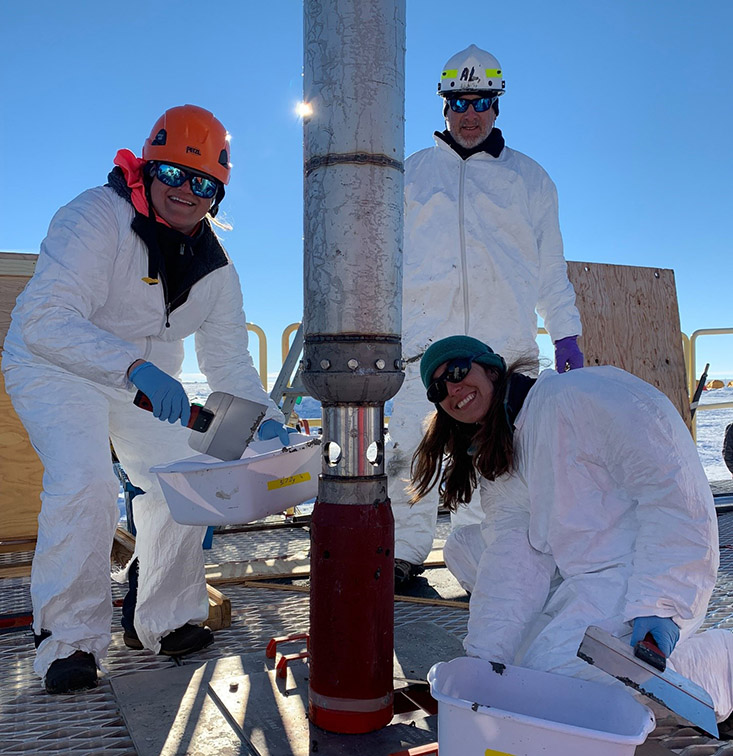Written By: Carrie Pinkard, Science Journalism Intern for USF CMS
When you close your eyes and think of Antarctica, the images you see are probably ripped straight from a movie screen. Penguins march en masse to their breeding grounds as seen in March of the Penguins. Researchers start disappearing into the cold blackness as seen in The Thing. However, those images aren’t the reality for scientists in Antarctica. USF College of Marine Science student Ryan Venturelli spent 6 weeks in Antarctica collecting sediment from a subglacial lake. Thankfully, she didn’t disappear, and she sat down with us to relay her experience.
Q. What was your research about?
A. I was part of a team deploying instruments to collect sediments from a subglacial lake beneath the West Antarctic Ice Sheet. In the coming months, we will be using these sediments to gain a better understanding of the history of the West Antarctic Ice Sheet.
Q. How long were you there?
A. Most of us were in Antarctica for 6 weeks, and we were at our field site (Mercer Subglacial Lake) for 3 ½ weeks. When we first arrived, we had some time at McMurdo Station where we received cargo and prepared the supplies we would need to do our work in the field. Then we went to the field where we collected samples (sediment and water from the lake). At the end of the trip we spent some time back on station where some people started experiments and others prepared samples for the long journey back to the US.
Q. So you went during the Antarctic summer meaning it was light 24/7. Did you lose track of time?
A. While we were on station it was easier to keep track of time because you’re busy during normal working hours. When we were in the field, the operations were 24 hours, so time became kind of immaterial. We worked around when our instruments were being deployed and slept when we weren’t working. I certainly thought that I would have more trouble sleeping with the sun up than I did.
Q. Where did you sleep?
A. In a little mountain tent. Which was very warm. It was like being in a little green house.
Q. What did a typical day look like for you?
A. I would wake up and make coffee. Depending on what was going on on deck, I would check there or in the lab to see if there was anything that needed to be done before coring operations started. When I was involved in deploying an instrument I would get to be on deck reading out numbers to be sure we were keeping good track of the instrument as it descended. Once the instrument came up, I focused on working with the team to take care of samples we collected.
Q. What did you do for fun when you weren’t doing research?
There was a big tent where people ate and hung out. Once work was done, people would do leisurely activities like play games or watch movies. Sometimes we went for walks on the runway to stretch our legs. Camp isn’t very big so you’re not walking a lot or exercising. It was nice because you don’t have the distraction of the internet or your phone. People were just really present and engaged in conversation with each other.
Q. Did someone cook for you?
A. We had one full time chef. We would take turns doing dishes and chores around the rack tent. It was very summer campy.
Q. How did the weather affect your mood?
I don’t really think the weather affected my mood; it was actually really nice. I felt warmer than I expected to feel. It was really funny to see people getting tan while we were in the middle of Antarctica.
Q. What is something you think people misunderstand about Antarctica?
A. People think it’s the most hardcore environment ever. And yes, it is a harder place to work because of the weather and the risk. But it was really kind of an enjoyable experience. There’s great support for the work that we do.
Q. What did you have to wear on a daily basis? How many layers?
A. If I was working on the deck deploying an instrument, it was a lot of layers. At least two pairs of pants. We wore Tyvek suits, which were like big white bunny suits, so we wouldn’t shed and contaminate our samples.
Q. What was the most interesting thing you saw? Did you see any wildlife?
A. I saw penguins from afar on station. I also saw some seals near Scott Base (The neighboring Kiwi station). While we were at camp we had Skua fly around overhead. They’re basically like big seagulls. There’s nothing for them to eat out there, so it was wild to see birds that far inland.
Q. What conveniences did you miss the most?
A. I was really surprised by how much I didn’t miss. I did miss being able to cook my own food. I missed having the option of fresh fruits and vegetables whenever I wanted. I definitely didn’t miss U.S. politics.
Q. What was it like spending the holidays in Antarctica?
A. It was fun! We had a nice a Christmas dinner and watched A Christmas Story. We listened to Christmas carols, and we decorated a little wire Christmas tree. For New Year’s Eve, they made a big tin foil turkey to use as a ball to drop. We all hung out and enjoyed each other’s company.
Q. Where in the world would you want to go do research next?
A. The Arctic would be cool. I clearly like the cold. I would like to keep going back to Antarctica!
